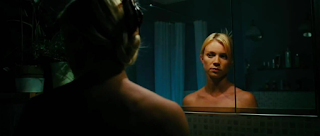Research into Genre - Psychological Thriller
The genre, psychological thriller, is a thriller story which emphasises the psychology of its characters and their unstable emotional states.It is a specific sub-genre of the broad range thriller and horror. There are many different themes which are related to this particular genre that many films follow: reality, perception, mind, existence/purpose, identity and death. In psychological thrillers, characters often battle their own minds: they attempt to determine what is real, who they are, and what life's purpose is.
The genre, psychological thriller, is a thriller story which emphasises the psychology of its characters and their unstable emotional states.It is a specific sub-genre of the broad range thriller and horror. There are many different themes which are related to this particular genre that many films follow: reality, perception, mind, existence/purpose, identity and death. In psychological thrillers, characters often battle their own minds: they attempt to determine what is real, who they are, and what life's purpose is.
Conventions:
- The main colours used are usually white, red and black. Red and black are also closely linked to horror, these colours signify danger, violence, blood and mystery. Low key lighting is often used on the main characters to create enigma and mystery. In some cases the low key lighting is used to represent the inner darkness within the character. The background is often dark to emphasise this. It also helps to create an unsettling atmosphere, to build tension.
- The music usually used in a psychological thriller is very eerie and tense, directors used this to build up tension in a scene or create shock within an audience.
- Quick camera movements are used to reflect the panic in a scene which then makes the audience feel the same emotions as the character.
- Props such as mirrors are commonly used to portray the use of reflections of a characters inner self as well as representing the 'dark side' of a character.
- Most commonly the antagonist or the 'villain' wear casual or smart clothes to fit in with the theory that most psychological thrillers are set in an urban and modern setting. Also that most villains are undercover and try to 'act' as a normal person.
- Montage editing is used frequently to highlight the emotions and feelings, suspense and tension within a scene. Flashbacks is a typical convention as it shows what previously happened to the villain and give an insight into their past and show the audience why the character is how they are.
- Conventional actors and actress' include: Julia Roberts, Ashley Judd and Tom Lee Jones.
- Companies that mainly work in this particular genre include: New line cinema, Columbia and Icon.
According to Steve Neale, film genre goes through a theoretical cycle and changes throughout its lifetime. These changes consist of its signs, orientations and expectations. Genre is not something static, as it is always evolving.He thinks there is a cycle consisting of the following stages:
1. Form finds itself - this is the ground breaking film: Psycho
2. Classic: Cape fear
3. Pushes boundaries - this is tweaking elements: The sixth sense
4. Parody - focuses on elements in the genre and mocks them: Scary movie (parodies the sixth sense etc)
5. Homage - makes reference to other films as a mark of respect: Seven
Audiences enjoy watching physiological thrillers for different reasons. The uses and gratification theory is able to explain why certain audiences enjoy watching thrillers.
Information - finding out about relevant events and conditions in immediate surroundings and gaining sense of security through knowledge.
Entertainment - escapism, being diverted from problems, relaxing and emotional release
Social interaction - gaining insight into circumstances of others, identifying with others and gaining a sense of belonging, helping carry out social roles.
Using the uses and gratifications theory it is clear to see that thrillers are watched for entertainment, information, social interaction and personal values, therefore it is a popular genre.
Famous psychological thrillers:
- Seven
- The Machinist
- The Silence of the lambs
Social interaction - gaining insight into circumstances of others, identifying with others and gaining a sense of belonging, helping carry out social roles.
Using the uses and gratifications theory it is clear to see that thrillers are watched for entertainment, information, social interaction and personal values, therefore it is a popular genre.
Famous psychological thrillers:
- Seven
- The Machinist
- The Silence of the lambs



No comments:
Post a Comment